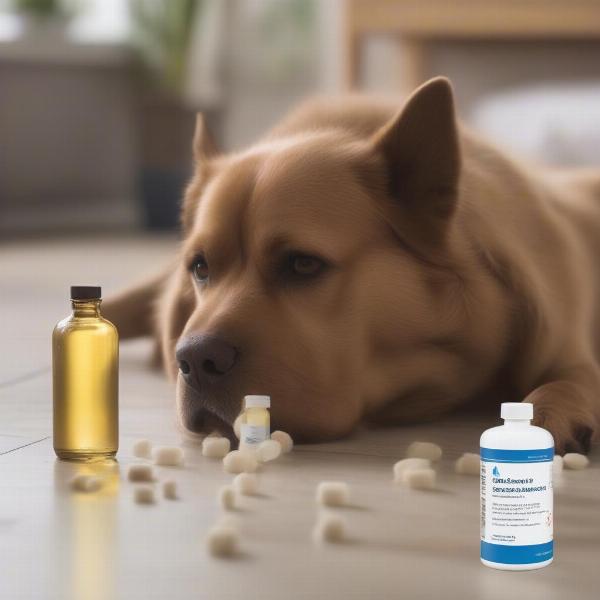Endosorb for dogs dosage is a crucial topic for pet owners dealing with potential toxin exposure. Understanding how to administer activated charcoal, the active ingredient in Endosorb, correctly can be vital in mitigating the effects of certain poisons. This guide will provide a comprehensive overview of Endosorb, its uses, appropriate dosage, and important safety considerations.
Understanding Endosorb and Activated Charcoal
Endosorb is a brand name for activated charcoal, a highly porous substance known for its ability to adsorb toxins in the digestive tract. It works by binding to toxins, preventing their absorption into the bloodstream. This can be particularly helpful in cases of accidental ingestion of certain poisons, though it’s crucial to consult a veterinarian immediately if you suspect your dog has been poisoned.  Endosorb Activated Charcoal for Dogs
Endosorb Activated Charcoal for Dogs
While Endosorb can be a valuable tool, it’s not a universal antidote. It’s most effective against certain types of poisons, and its efficacy depends on factors like the type of toxin ingested, the amount ingested, and the time elapsed since ingestion.
Determining the Correct Endosorb for Dogs Dosage
The recommended endosorb for dogs dosage generally ranges from 1 to 5 grams of activated charcoal per kilogram of body weight. So, for a 10kg dog, the dose would be between 10 and 50 grams. However, it’s essential to consult your veterinarian for the precise dosage for your dog’s specific situation. They can take into account the type of toxin, the severity of the poisoning, and your dog’s overall health.
Administering Endosorb typically involves mixing the powder with water to form a slurry and giving it orally using a syringe or by adding it to the dog’s food. Some formulations of activated charcoal are also available in tablet or capsule form. Your vet can advise on the best method of administration.
When to Use Endosorb for Your Dog
Endosorb is most commonly used in cases of suspected poisoning. Common household toxins that activated charcoal may be effective against include chocolate, certain medications (like ibuprofen or acetaminophen), and some types of insecticides. However, it’s crucial to emphasize that Endosorb should never be used without veterinary guidance. endosorb dosage for dogs
Safety Considerations and Potential Side Effects
While generally safe, Endosorb can have some potential side effects, including vomiting, constipation, and black stools. In rare cases, aspiration pneumonia can occur if the charcoal enters the lungs. Therefore, extreme care must be taken when administering Endosorb.
Contraindications for Endosorb Use
There are certain situations where Endosorb should not be used. These include if your dog is unconscious, having seizures, or if they’ve ingested corrosive substances like bleach or drain cleaner. In these cases, different treatment approaches are required. where can i buy activated charcoal for dogs
Conclusion
Knowing the correct endosorb for dogs dosage is essential for pet owners. While activated charcoal can be a valuable tool in certain poisoning cases, it’s vital to remember that it’s not a substitute for professional veterinary care. Always consult your veterinarian immediately if you suspect your dog has been poisoned. They can provide the best guidance and treatment plan for your dog’s specific situation. pro bind for dogs
FAQs
-
What should I do if I think my dog has been poisoned? Immediately contact your veterinarian or an animal poison control center.
-
Can I give my dog Endosorb without consulting a vet? No, always consult your vet before administering any medication, including Endosorb.
-
How long does Endosorb take to work? Endosorb typically begins working within minutes of administration.
-
Are there any home remedies for dog poisoning? No, home remedies can be dangerous and should be avoided. Always seek professional veterinary care.
-
How can I prevent my dog from being poisoned? Store all potentially toxic substances safely out of your dog’s reach.
-
Can I use human activated charcoal for my dog? It is best to use a product specifically formulated for veterinary use. Consult your vet for guidance.
-
What are the signs of poisoning in dogs? Signs of poisoning can vary widely but may include vomiting, diarrhea, lethargy, tremors, seizures, and difficulty breathing. stool ease for dogs
Related Articles:
About ILM Dog:
ILM Dog is your trusted global resource for expert advice on dog care and wellbeing. We cover a wide range of topics, from breed selection and health care to training, nutrition, and grooming. Whether you’re a seasoned dog owner or just starting your journey, ILM Dog offers practical, reliable information to help you provide the best possible care for your canine companion. We specialize in helping you understand your dog’s specific needs, including breed-specific advice, health management, and behavioral guidance. Contact us today for personalized advice and support. Email: [email protected] Phone: +44 20-3965-8624.